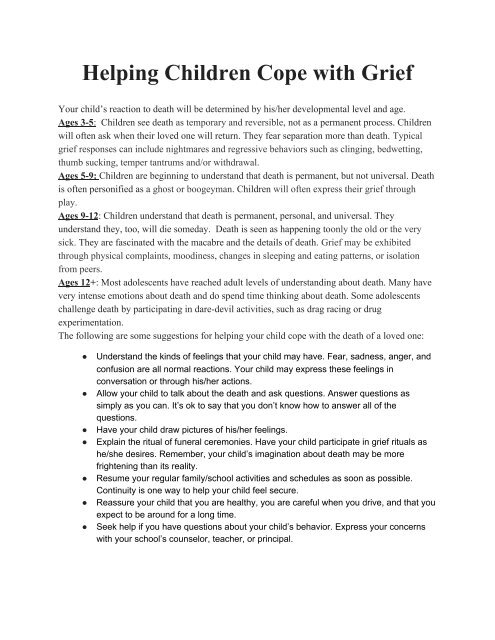Untitled document (1)
Create successful ePaper yourself
Turn your PDF publications into a flip-book with our unique Google optimized e-Paper software.
Helping Children Cope with Grief<br />
Your child’s reaction to death will be determined by his/her developmental level and age.<br />
Ages 3-5: Children see death as temporary and reversible, not as a permanent process. Children<br />
will often ask when their loved one will return. They fear separation more than death. Typical<br />
grief responses can include nightmares and regressive behaviors such as clinging, bedwetting,<br />
thumb sucking, temper tantrums and/or withdrawal.<br />
Ages 5-9: Children are beginning to understand that death is permanent, but not universal. Death<br />
is often personified as a ghost or boogeyman. Children will often express their grief through<br />
play.<br />
Ages 9-12: Children understand that death is permanent, personal, and universal. They<br />
understand they, too, will die someday. Death is seen as happening toonly the old or the very<br />
sick. They are fascinated with the macabre and the details of death. Grief may be exhibited<br />
through physical complaints, moodiness, changes in sleeping and eating patterns, or isolation<br />
from peers.<br />
Ages 12+: Most adolescents have reached adult levels of understanding about death. Many have<br />
very intense emotions about death and do spend time thinking about death. Some adolescents<br />
challenge death by participating in dare-devil activities, such as drag racing or drug<br />
experimentation.<br />
The following are some suggestions for helping your child cope with the death of a loved one:<br />
●<br />
●<br />
●<br />
●<br />
●<br />
●<br />
●<br />
Understand the kinds of feelings that your child may have. Fear, sadness, anger, and<br />
confusion are all normal reactions. Your child may express these feelings in<br />
conversation or through his/her actions.<br />
Allow your child to talk about the death and ask questions. Answer questions as<br />
simply as you can. It’s ok to say that you don’t know how to answer all of the<br />
questions.<br />
Have your child draw pictures of his/her feelings.<br />
Explain the ritual of funeral ceremonies. Have your child participate in grief rituals as<br />
he/she desires. Remember, your child’s imagination about death may be more<br />
frightening than its reality.<br />
Resume your regular family/school activities and schedules as soon as possible.<br />
Continuity is one way to help your child feel secure.<br />
Reassure your child that you are healthy, you are careful when you drive, and that you<br />
expect to be around for a long time.<br />
Seek help if you have questions about your child’s behavior. Express your concerns<br />
with your school’s counselor, teacher, or principal.
















